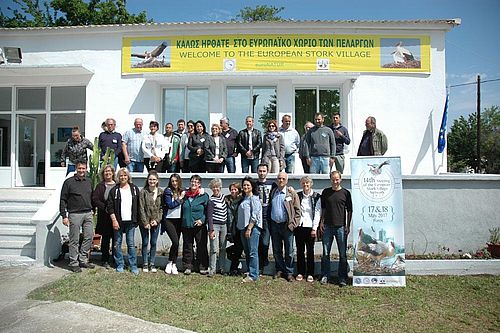A Network for the White Stork
From 16 to 20 May 2017, the 14th conference of European Stork Villages was held in Poros, Greece. About 50 representatives of nearly all the stork communities as well as international nature conservation experts gather for four days to develop programmes on how to advance stork protection throughout Europe. ++ Storks, too, fall victim to poaching on their migration across the Mediterranean.

Radolfzell. From 16 to 20 May 2017, the Greek village of Poros hosts the 14th conference of European Stork Villages. About 50 representatives of nearly all the stork communities as well as international nature conservation experts gather for four days to develop programmes on how to advance stork protection throughout Europe.
Since 1994 the international nature conservation foundation EuroNatur has been honouring European villages which contribute to stork conservation in an outstanding manner. Presently, the network includes 15 villages. Poros has been the latest community to receive the coveted award. The village is situated close to the Evros delta at the border of Greece and Turkey. The storks find a rich menu in the wet meadows, lagoons and rice fields in the Evros flood area. No wonder that this area is among the most important breeding grounds for white storks in Greece. About 200 square kilometres of the delta form a national park.
Another Garden of Eden for white storks are the floodplain forests of the river Sava near Čigoć, Croatia, the first community which received the title of a stork village by EuroNatur. Here, in one of the largest colonies of white storks in Europe, biologists marked the male white stork Tesla with a GPS transmitter on June 16th, 2016, which allowed them to precisely follow his migration routes. Last autumn, Tesla travelled across the Bosporus and across the Levant to Africa, where he stayed for the winter. This spring, Tesla set out to return to his home in Croatia. However, early in the morning on the 11th of April, his journey found a sudden end: Lebanese bird hunters killed the stork. Unfortunately this is not an isolated case: Throughout the eastern Mediterranean the elegant gliders are being shot ruthlessly every year.
Under the gun along the migration route, habitat loss in the breeding areas – the storks suffer severe pressures, which makes a strong network like the European Stork Villages the more important. “Poros as the youngest member integrated itself commendably into the stork village community und through its strong commitment is an inspiration also to the other stork villages,” says Dr. Stefan Ferger, ornithologist and project leader with EuroNatur. This year’s meeting in Poros shall enable transfer of knowledge and thus contribute to transferring successful strategies among the communities. This includes underlay for nests or rendering power poles and power lines safe – these are still a common cause of death for large birds such as the stork.
Key to stork conservation is maintaining and restoring extensively used meadows and pastures. “Despite positive trends in some regions, the white stork is still endangered in Europe because of the rapid changes in land use. Every day, hundreds of hectares of meadows and pastures get lost in Europe,” warns EuroNatur CEO Gabriel Schwaderer. In order to counter this trend, the European Stork Villages initiative is a flagship project for protecting these species-rich habitats.
Background information
- European Stork Villages: Since 1994 EuroNatur has been honouring villages as “European Stork Village” which host a large colony of storks and contribute to stork conservation in an outstanding manner. The latest new member of the network, the Greek village of Poros, received recognition on June 11th, 2016. In Germany, the village of Rühstädt, situated in the Elbe River Landscape Biosphere Reserve of Brandenburg, is a member of the network since 1996. Every year, representatives of the stork villages meet in one of the communities to discuss white stork conservation measures. The participants of the conference have written a joint resolution (pdf, 278 KB) on the protection of the storks.
- While bird hunting is officially banned in Lebanon, every year more than 2.6 million migratory birds are being shot in this country, including a large number of white storks. In order to finally achieve enforcement of existing laws, “SOS Tesla – Save White Storks” set up a petition to the president and the environment minister of Lebanon!
Contacts
EuroNatur, Westendstraße 3, 78315 Radolfzell, Tel.: +49 (0)7732 - 92 72 0, Fax: +49 (0)7732 - 92 72 22, info(at)euronatur.org, www.euronatur.org, contact person: Dr. Stefan Ferger, press contact: Christian Stielow, Tel: +49 (0)7732 - 92 72 15, christian.stielow(at)euronatur.org
 Report sighting
Report sighting
Have you seen a white stork or another interesting species of animal, plant or fungus? Make your observation count for nature conservation and share it with other nature lovers! It’s free and it’s fun!





